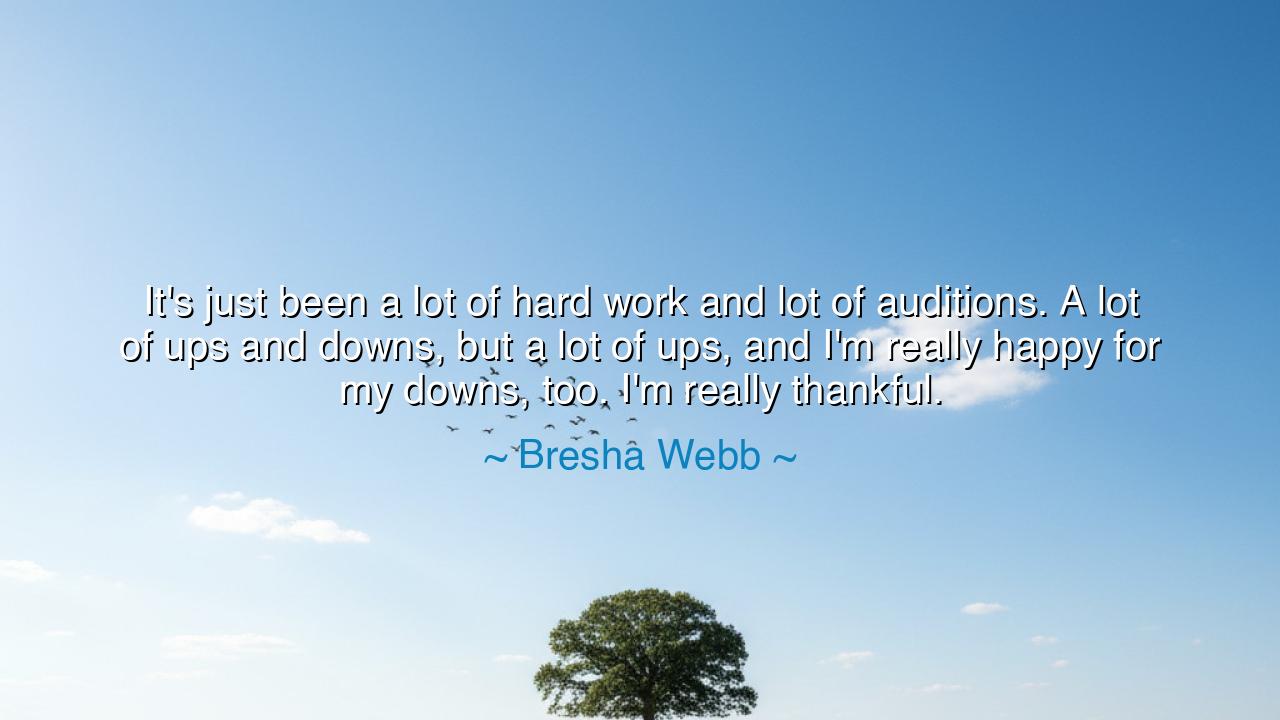
It's just been a lot of hard work and lot of auditions. A lot of
It's just been a lot of hard work and lot of auditions. A lot of ups and downs, but a lot of ups, and I'm really happy for my downs, too. I'm really thankful.






In the words of Bresha Webb, there is both honesty and triumph: “It’s just been a lot of hard work and a lot of auditions. A lot of ups and downs, but a lot of ups, and I’m really happy for my downs, too. I’m really thankful.” These are not merely the reflections of an actress upon her career—they are the eternal testimony of a soul that has endured struggle, embraced failure, and found gratitude in every step. To be thankful for the downs as well as the ups is a wisdom that few embrace, yet it is the key to lasting strength.
Her words begin with hard work and auditions, the grind of the craft. In the world of performance, talent alone is not enough; it is perseverance, patience, and resilience that shape the path. Auditions are the gates through which artists must pass, often closed more than open, often demanding more than they reward. To acknowledge this toil without bitterness, but instead with gratitude, reveals the spirit of one who has learned to see even rejection as a teacher.
This truth has been known through all ages. Consider Thomas Edison, who when asked about his countless failed attempts at invention, declared, “I have not failed. I’ve just found 10,000 ways that won’t work.” Like Bresha Webb, Edison did not curse the downs, but rejoiced in them, for he understood that every step—whether crowned with success or shadowed by failure—was part of the road to triumph. The downs are not chains; they are chisels, carving us into the shape we were meant to be.
Webb’s words also reveal the strength of gratitude. Gratitude transforms pain into growth, defeat into wisdom, and delays into preparation. By saying she is “happy for my downs,” she reframes failure as blessing. This is the ancient philosophy of the Stoics, who taught that we cannot control fortune, but we can control how we see it. If we meet hardship with gratitude, then hardship ceases to break us and instead becomes the forge of our endurance.
Her testimony also warns against the illusion of a life without struggle. Many dream only of ups, of unbroken victory, but such a path is fragile. A tree that grows only in calm weather will fall at the first storm. But the one that has endured the winds grows deep roots and unshakable strength. Webb’s thankfulness for her struggles is a declaration that her roots have been strengthened by every storm, and it is those storms that allow her victories to shine brighter.
The lesson for us is luminous: embrace both the ups and the downs, for both are sacred. Do not despise rejection, failure, or delay, for they are the teachers of patience and humility. Do not cling only to triumph, for triumph without trial is shallow and fleeting. Instead, walk the road with gratitude for every step, knowing that each one shapes the soul into something greater than ease ever could.
Practically, this means we must train ourselves to pause even in our downs and ask: What is this teaching me? What strength is being forged here? Write it down, hold it close, and let gratitude transform even sorrow into preparation. When victories come, celebrate them fully, but remember that they are built upon the foundation of countless struggles. To be thankful in both seasons is to live with unshakable resilience.
Thus the wisdom of Bresha Webb resounds: “I’m really happy for my downs, too. I’m really thankful.” These words are a hymn of perseverance, a reminder that life is not measured by uninterrupted ascent, but by the courage to rise again after every fall. May we, too, learn to give thanks not only for the moments of glory, but also for the trials that carve our strength—for in both, the soul is made whole.






AAdministratorAdministrator
Welcome, honored guests. Please leave a comment, we will respond soon